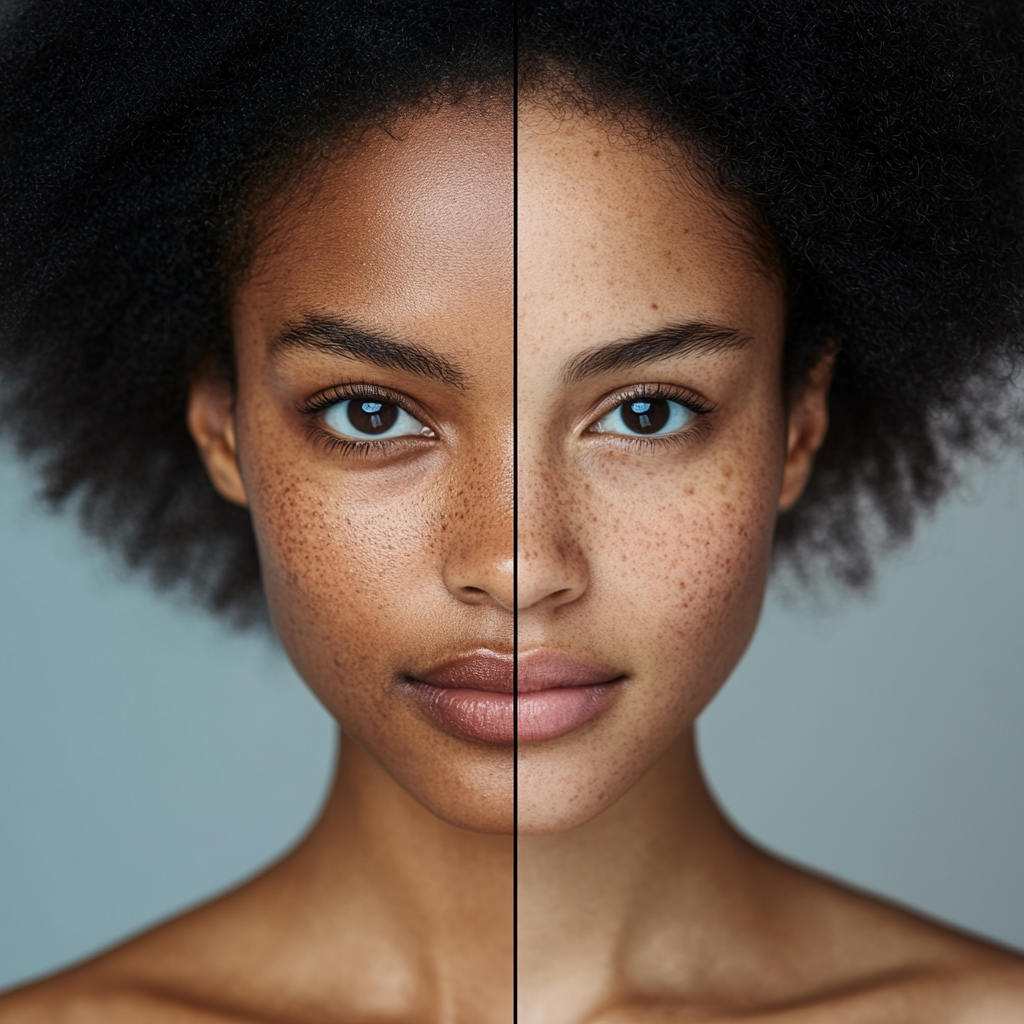
How UV Radiation Plays a Role in Premature Aging and Skin Discoloration for Black Women
As Black women, we are blessed with melanin, that magical pigment that helps shield our skin from some of the sun‘s harmful rays. You’ve probably heard people say, “Black don’t crack,” but let’s clear something up: while our skin is more resistant to visible signs of aging, it’s not invincible. Just like any other skin type, Black skin is vulnerable to the impact of UV radiation. So, buckle up let’s explore how UV radiation’s role in premature aging and skin discoloration may be sneaking up on us, and more importantly, how we can fight back.
UV Radiation: The Sneaky Culprit Behind Premature Aging and Skin Discoloration
We all love that sunny glow, but UV radiation is like that friend who overstays their welcome. At first, everything is bright and happy, but before you know it, things start going downhill. Ultraviolet (UV) rays come in two forms: UVA and UVB. UVA rays penetrate deep into the skin, causing long-term damage like wrinkles, fine lines, and you guessed it premature aging. UVB rays, on the other hand, are responsible for sunburns and can also contribute to skin cancer.
But here’s the catch: Black skin is rich in melanin, which offers a natural defense against UV radiation. Yet, this doesn’t make us immune. UV radiation still plays a significant role in premature aging and skin discoloration, even for Black women. It just shows up differently more on that later.
Myth Busted: Black Skin and UV Radiation
Raise your hand if you’ve ever heard someone say, “I don’t need sunscreen I’m Black!” Sis, this is one of the biggest myths circulating in our community. Yes, melanin is fabulous, but it’s not a magic shield. Black skin can still be affected by UV radiation. In fact, while we may not experience sunburns as easily as people with lighter skin tones, the damage can show up as hyperpigmentation, uneven skin tone, or even dark spots. And here’s a plot twist: we often don’t see the effects until much later in life, when we realize our skin is looking older than it should.
How UV Radiation Leads to Premature Aging
Let’s get into the science for a second. You might think wrinkles and fine lines are just the price of getting older, but much of this so-called “natural aging” is due to the sun. When UV rays penetrate your skin, they damage the collagen and elastin, the proteins responsible for keeping your skin firm and bouncy. This results in sagging, wrinkles, and, yes, premature aging. For Black women, this breakdown may not show up as early, but it will eventually appear, especially around the eyes and mouth.
A 2016 study published in the Journal of the American Academy of Dermatology found that exposure to UVA radiation accounts for up to 80% of skin aging, regardless of your skin tone. So even though our skin may age more gracefully, UV radiation still accelerates the process.
Skin Discoloration: The Silent Effect of UV Damage
Let’s talk about hyperpigmentation the struggle is real! If you’ve ever noticed dark patches on your skin, particularly after a breakout or rash, this is likely post-inflammatory hyperpigmentation (PIH). And here’s the kicker: UV exposure makes it worse.
Hyperpigmentation in Black women tends to be more pronounced because our skin produces more melanin in response to any type of trauma, whether it’s acne, a cut, or you guessed it – UV radiation. This process causes the skin to darken in patches. So, every time you step outside without sunscreen, those UV rays are silently worsening any existing discoloration.
Remember those family BBQs or beach days when you didn’t bother with sunscreen? Yeah, that’s when the damage happens. Over time, repeated exposure can lead to a more uneven complexion, with darker areas that seem to appear out of nowhere. Hyperpigmentation can be stubborn, but the good news is there are steps you can take to protect your skin and prevent further damage.
Protecting Your Melanin

Okay, so now that we’ve established that UV radiation is out to get us, what can we do about it? The first step is to incorporate sun protection into your daily routine, and yes, even on cloudy days. Sunscreen isn’t just for beach vacations it’s for everyday life. A broad-spectrum sunscreen with an SPF of at least 30 is ideal for Black skin because it protects against both UVA and UVB rays.
And let’s be real, finding a sunscreen that doesn’t leave that ashy, ghostly cast can be a struggle. But the beauty industry is catching up, and there are now plenty of options specifically formulated for darker skin tones. Look for products with ingredients like zinc oxide or titanium dioxide, which are less likely to leave a white film on your skin. And remember, reapplying throughout the day is just as important as putting it on in the first place.
The Power of Antioxidants
In addition to sunscreen, incorporating antioxidants into your skincare routine is a game-changer. UV radiation generates free radicals, those pesky molecules that cause damage at a cellular level. Antioxidants help neutralize these free radicals, reducing the damage done to your skin.
Look for serums and moisturizers that contain ingredients like vitamin C, vitamin E, and niacinamide. These powerhouses not only protect your skin but also help brighten your complexion and fade existing hyperpigmentation. A study published in Dermatologic Surgery found that topical antioxidants can significantly reduce the appearance of dark spots and improve overall skin tone.
Hydration Is Key
Listen, I know life gets busy, but hydration should never take a back seat. UV radiation not only ages the skin but can also dehydrate it, making fine lines and wrinkles more pronounced. Drinking plenty of water and using hydrating products can keep your skin looking plump and youthful.
A good moisturizer with ingredients like hyaluronic acid or glycerin will help lock in moisture and create a protective barrier against environmental damage. When your skin is well-hydrated, it can repair itself more efficiently, and it looks healthier overall.
Conclusion: Love Your Skin, Protect Your Skin
Black don’t crack but it can certainly wrinkle, sag, and discolor if we’re not careful. UV radiation plays a significant role in premature aging and skin discoloration, even for those of us with deeper skin tones. While melanin offers some protection, it’s not enough to stop the long-term damage caused by UVA and UVB rays. The key to maintaining your skin’s youthful glow and even complexion is consistent protection – yes, that means daily sunscreen use, rain or shine.
Incorporating antioxidants and hydration into your skincare routine can also make a world of difference. With the right care, you can keep your skin looking radiant and healthy for years to come. So, next time you’re tempted to skip the sunscreen because you think you don’t need it, remember: UV radiation doesn’t discriminate. Love your skin enough to protect it!


